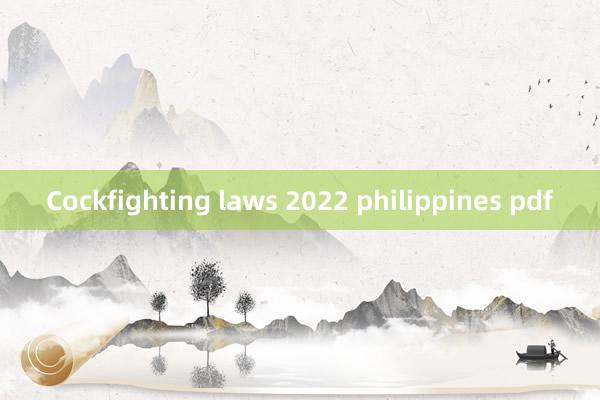
Cockfighting Laws in the Philippines in 2022: An Overview
Cockfighting, known locally as "sabong," is a traditional blood sport deeply ingrained in Philippine culture. The sport, where roosters are pitted against each other in a fight to the death, has long been a part of the country's customs, especially in rural areas. Despite its cultural significance, cockfighting is heavily regulated by law. The government has imposed rules to control and limit the practice, ensuring that it operates within legal boundaries and does not encourage illegal activities. This article explores the cockfighting laws in the Philippines as of 2022, highlighting the legal framework, regulations, and controversies surrounding the sport.
Cockfighting in the Philippines is regulated under Presidential Decree No. 449, also known as the "Cockfighting Law of 1974." This decree, issued by then-President Ferdinand Marcos, outlines the legal guidelines for cockfighting operations. While the law acknowledges the sport's cultural importance, it sets strict boundaries on how it can be practiced.
The decree legalizes cockfighting only in licensed cockpits and only on specific days, such as Sundays, legal holidays, and local fiestas. Additionally, Hướng Dẫn Sử Dụng Link Vào K8 Mới Nhất_ Trải Nghiệm Và Cập Nhật the law allows for cockfights during specific national and local celebrations, Tìm Hiểu Về Link Vào Nhà Cái W88_ Những Điều Cần Biết provided they are organized by licensed promoters and overseen by proper authorities.
Under the Cockfighting Law of 1974, Bộ phần mềm học tiếng Việt BC Nhớ Lần Mới BC - Học Tiếng Việt một cách thú vị và hiệu quả the following regulations must be adhered to:
Licensing and Operation: Cockpits must obtain a license from the local government unit (LGU) where they operate. Only licensed cockpits can legally hold cockfighting events. Cockpit operators are responsible for ensuring that their events are conducted according to legal and ethical standards.
Days for Cockfights: Cockfighting is only permitted on Sundays, legal holidays, and during fiestas. Special cockfighting events may be authorized by local government units for national or local celebrations. However, these events require prior approval from the authorities.
Rooster Fights: Only roosters are allowed to participate in fights. The use of any other animal in the sport is strictly prohibited. Additionally, cockfighting matches must follow traditional procedures, including the fitting of gaffs (sharp blades) to the roosters’ legs. These gaffs are used during the fight, which typically lasts until one of the roosters is killed or severely injured.
go88 comIllegal Betting: Betting on cockfights is a common practice in the Philippines. While betting within licensed cockpits is permitted, any form of betting outside these venues is considered illegal. Those caught engaging in illegal betting may face penalties, including fines and imprisonment.
The COVID-19 pandemic significantly impacted the cockfighting industry in the Philippines. In 2020, all cockpits were closed as part of the government’s efforts to curb the spread of the virus. This sudden shutdown caused a massive economic loss for many Filipinos who depend on cockfighting for their livelihood, including cockpit operators, breeders, and workers.
As restrictions eased, cockfighting gradually resumed in certain areas, but under strict health protocols. Cockpits were required to limit the number of attendees, enforce social distancing, and implement sanitation measures. The government also encouraged the use of online sabong, where betting and viewing of cockfights could be done through digital platforms. While this adaptation helped the industry recover, it also raised concerns about potential abuses and the rise of illegal online gambling.
Despite its legal status, cockfighting has faced growing opposition from animal rights groups and advocates. Critics argue that the sport promotes cruelty to animals, as the roosters are forced to fight to the death, often suffering severe injuries in the process. These groups have called for stricter regulations or an outright ban on cockfighting in the Philippines.
In response to these criticisms, lawmakers have proposed amendments to the Cockfighting Law, aiming to address animal welfare concerns. However, these proposals have met resistance from those who view cockfighting as a cultural tradition and a source of income for many rural communities.
Another issue that has arisen in recent years is the proliferation of illegal cockfighting events or "tigbakay," which are organized without proper licenses and often involve underhanded activities such as illegal gambling. Authorities have ramped up efforts to crack down on these underground operations, but enforcement remains a challenge, particularly in remote areas.
Cockfighting remains a legally regulated activity in the Philippines, protected by its cultural heritage while being constrained by the legal framework outlined in the Cockfighting Law of 1974. As of 2022, the sport continues to face challenges, including calls for more humane treatment of animals and the need to combat illegal gambling associated with the practice. The COVID-19 pandemic also prompted changes in how cockfighting is conducted, with the rise of online sabong offering new opportunities and risks for the industry.
The future of cockfighting in the Philippines will likely depend on balancing its cultural significance with modern concerns about animal welfare and illegal activities.
jili gcashwww.russarmy.com